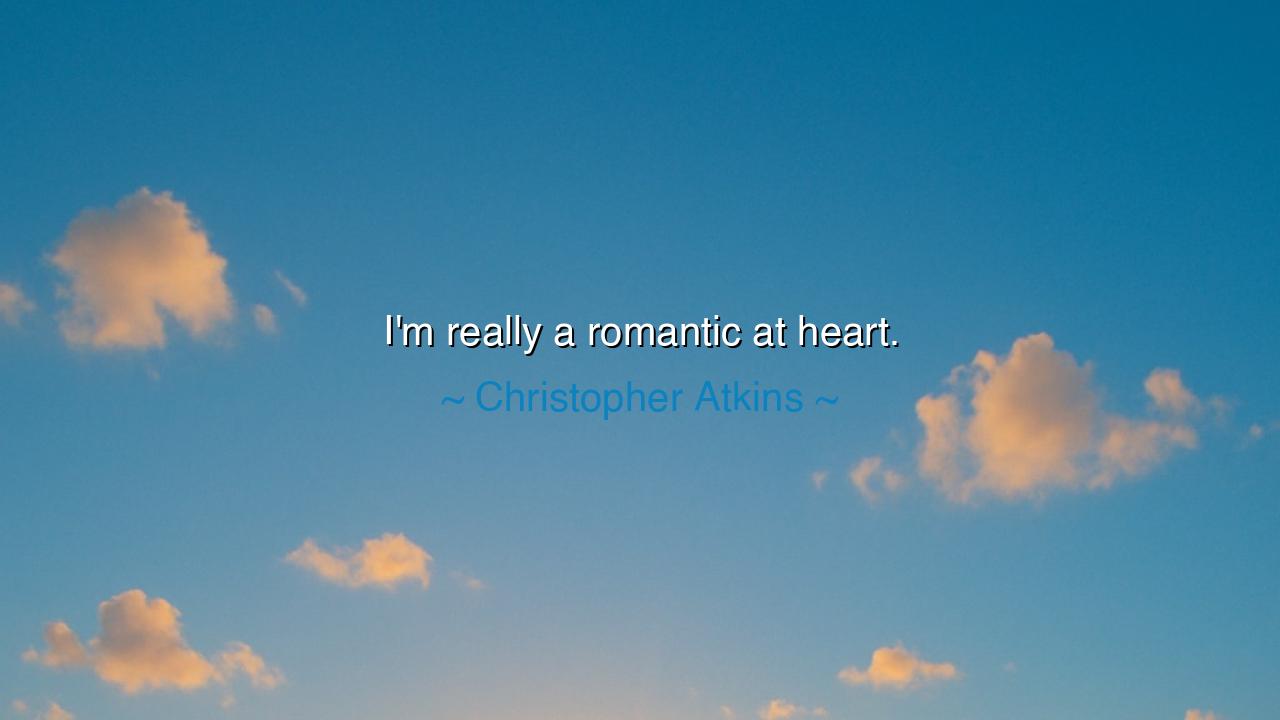
I'm really a romantic at heart.






"I'm really a romantic at heart." – Christopher Atkins. These words speak to the core of human nature—the deep-seated longing for connection, beauty, and meaning that defines the essence of being human. To be a romantic at heart is to embrace the ideals of love, passion, and the pursuit of dreams, no matter how impossible they may seem. In a world that often prizes practicality and logic over emotional truth, to call oneself a romantic is to acknowledge the vulnerability and sensitivity that reside within us all. It is a declaration that the soul yearns not just for survival but for connection, for depth, and for the kind of love that transcends the ordinary.
In the ancient world, romanticism was seen not as an escape from reality, but as a pathway to deeper truths. The Epic of Gilgamesh, one of the oldest known stories, is as much about friendship and love as it is about heroism and death. Gilgamesh, the mighty king, embarks on a journey of self-discovery and transformation, seeking not just immortality but also understanding the bonds of love and loss. The romantic in the ancient sense was the seeker of both the grand and the intimate—the person who, like Gilgamesh, searched for meaning in a world that was both brutal and beautiful. To be a romantic was to recognize that the soul’s journey was incomplete without the deep connections we form with others.
Plato, the great philosopher, also spoke of love and the soul’s yearning for something greater. In his dialogue The Symposium, Plato examines the nature of love, not just as a physical or fleeting emotion but as something that connects the lover to the eternal beauty and truth. For Plato, romantic love was a path to the divine, a means by which humans could transcend their base desires and reach for something more profound. Similarly, Atkins' acknowledgment of his romantic nature speaks to this timeless human aspiration—the longing to connect deeply with another and to pursue a love that elevates us, rather than diminishes us.
In the stories of Romeo and Juliet, love is both the most beautiful and tragic of human emotions. Shakespeare’s tale of youthful romance—an all-consuming passion that defies family and fate—is the quintessential romantic narrative. But beyond the tragedy, it also speaks to the idealism of love: the belief that love is the ultimate force, greater than any feud, than any barrier. Like Romeo and Juliet, romantics like Atkins are drawn not only to the pleasure of love but to the sacrifice and the idealism that love demands. Romanticism, in its purest form, is a desire to transcend the mundane and touch the infinite.
The challenge for modern romantics, however, lies in balancing the ideal with the real. In an age where pragmatism often dominates, to be a romantic at heart can sometimes feel like a weakness or an impossibility. The real world, with its challenges and complexities, seems at odds with the idealistic dreams that fuel the romantic spirit. Yet, romanticism is not a retreat from reality, but a commitment to seeing the world in its fullest, most beautiful form. It is the vision of a world where love, art, and beauty are not mere decorations, but the very substance of existence.
Consider the life of John Keats, the great Romantic poet, whose works were filled with a longing for beauty and transcendence. Keats believed that beauty and truth were inseparable, and he sought both through his poetry. Though he died young, his work remains a testament to the power of romantic vision—to see the world through the lens of beauty, even in the face of suffering. Keats’ life was short, but it was rich with romantic spirit, one that believed in the transformative power of love and beauty. Like Keats, Atkins’ admission of being a romantic at heart signals an embrace of life’s more ethereal dimensions—the dream, the passion, the connection—that give life its richness and depth.
The lesson we can draw from Atkins’ words is one of embracing vulnerability and idealism. In a world that often tells us to be practical and guarded, to allow ourselves to remain open to love and beauty is an act of courage. The romantic heart does not shy away from the possibility of pain or disappointment, but sees it as part of the journey. In our own lives, we should strive to honor the romantic within us—to pursue what is beautiful, to connect deeply with others, and to seek meaning beyond the mundane. Whether through love, art, or human connection, the romantic heart calls us to live fully, to dream expansively, and to believe in the extraordinary power of the human spirit.
In practical terms, we can all embrace our romantic nature by seeking out beauty in the everyday, by engaging with love and art not as fleeting distractions, but as profound experiences that shape our existence. Like the great romantics of history, let us see the world not as it is, but as it could be—a place of deep connection, infinite possibility, and unwavering love. When we live with this vision in our hearts, we become part of a tradition that has transcended time, one that believes in the power of the soul to transform the world.






AAdministratorAdministrator
Welcome, honored guests. Please leave a comment, we will respond soon